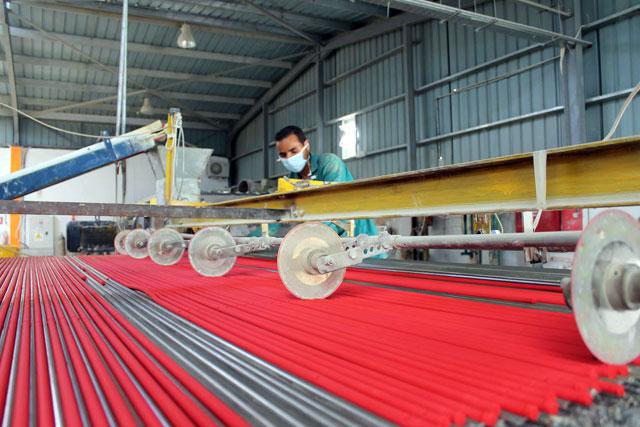You are here
‘Jordan has potential to export highly sophisticated products’
By Dana Al Emam - Aug 03,2017 - Last updated at Aug 03,2017
AMMAN — A new study suggests that advancing the government’s supportive policies to the industrial sector, including the opening of new markets, is essential for enhancing the exposure of Jordan’s “highly-sophisticated” products.
The industrial sector benefits the most when it focuses on manufacturing highly-sophisticated products to export to new markets, such as the European, African and American markets, the study added.
In addition, there is a need to further develop the quality of products in the country’s most sophisticated industries, including wood production, transportation, chemical products, textiles and vegetables, in order to compete in global markets, according to the study, conducted by the Jordan Strategy Forum (JSF).
Titled “New Opportunities to Diversify Industrial Exports”, the study is the second phase of a study project which seeks to underline Jordan’s Economic Complexity as a driver for economic prosperity in a bid to boost economic growth, enhance job opportunities and encourage investments, according to the JSF.
The economic complexity of a country is derived from an evaluation of the diversification and sophistication of a country’s basket of manufactured goods, the study said.
The first phase of the study found that Jordan has an opportunity to enhance export revenues and boost its competitiveness by diversifying the basket of manufactured goods, and increasing the sophistication of these products.
While Jordan currently manufactures and exports 581 products, there are 637 products that the Kingdom does not export, some of these products are close to Jordanians’ productive knowledge and some are above the sophistication average of locally produced products.
The study recommends supporting research and development activities in order to encourage investments, which added that providing the necessary infrastructure and striking a balance between opening up to new markets and protecting the local market from flooding with foreign products are also key measures for economic growth.
But in order for local industries to compete internationally, factories need to have energy at lower costs.
“JSF recommends easing procedures in setting up renewable energy for factories,” said the study, adding that factories can reduce their energy bills by 60 per cent by using renewable energy.
The study also proposes easing access to finance for manufacturers willing to move to new industries or to expand their existing factories, as investments of this type are of direct impact on increasing the overall economic growth.
This end can also be achieved through utilising the skills of refugees, many of whom are skilled labourers.
Related Articles
AMMAN — By diversifying the basket of manufactured goods and increasing the sophistication of these products, Jordan has an opportunity to e
AMMAN – The Jordan Strategy Forum (JSF) on Tuesday issued a study on the EU plan to relax the required rules of origin for Jordanian industr
AMMAN — A Jordanian chemical engineer noticed an industry gap in the Kingdom, which eventually led him to a great achievement: Opening a sma

















